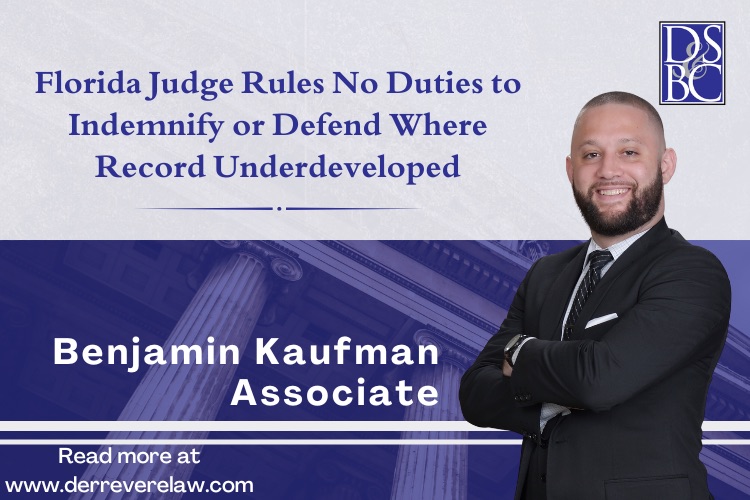Bryan Black Successfully Defends Client in Million Dollar Arbitration Claim

This matter arises from a contractual relationship between a Contractor and Paver Manufacturer whereby Contractor claimed that the products provided for a high-profile project in Houston, Texas were faulty and failed to meet both the Project specifications and the Manufacturer’s published data. Contractor was initially sued by the Project Owner for non-conforming products and Owner and Contractor elected to settle the matter for One Million Dollars. Contractor thereafter filed suit against Manufacturer in a Texas District Court where the Project was located, asserting it was owed One Million Dollars and asserting claims for Breach of Contract, Breach of Warranty, Negligence, Fraud, Negligent Misrepresentation, Fraudulent Inducement, Statutory and Common Law Indemnity, Strict Product Liability, Product Liability on Theory of Negligence, Deceptive Trade Practices and Attorney’s Fees. The case was removed on diversity jurisdiction to the United States District Court for the Southern District of Texas. The Manufacturer’s contract contained a choice of law/jurisdiction provision which was enforced and as a result the case was transferred to the United States District Court for the Southern District of Florida. The substantive law of Florida was to be applied. Due to the pandemic and other procedural issues, the Parties agreed to move the case to Private Arbitration for all issues and entered into a formal written Arbitration Agreement.
After years of litigation, and prior to the Final Arbitration Hearing, Manufacturer filed a Motion for Partial Summary Judgment which asserted that the Economic Loss Rule and the Independent Tort Doctrine precluded Contractor’s claims for Negligence, Fraud, Negligent Misrepresentation, Fraudulent Inducement, Strict Products Liability, and Products Liability on the Theory of Negligence, precluded such claims, as a matter of law. In the absence of a personal injury or property damages to other property a claim for strict products liability was precluded and that pursuant to the Contract, the parties agreed Florida law governed and thereby Contractor’s claims for statutory indemnification based on Texas law and for deceptive trade practices based upon the Texas Deceptive Trade Practices Act, were precluded. Prior to the Arbitrator ruling on the Manufacturer’s motion, while at the Final Arbitration Hearing, Contractor elected to drop all of the aforementioned claims, proceeding only on a single claim of Breach of Contract.
During the two-day Final Arbitration Hearing, Manufacturer presented evidence that the Contractor was a sophisticated and experienced commercial enterprise in the business of entering into contracts with suppliers. The transaction between Contractor and Manufacturer was, at all times material, at arms-length. Contractor agreed to be bound by the standard Terms and Conditions of the Contract, some of which provided: Our Liability is Limited to Replacement of The Product Only. FOB Factory; all claims must be reported within (3) days after delivery…; Buyer shall not be entitled to recover any special, indirect, incidental or consequential damages; and Installation of the materials constitutes acceptance.
Manufacturer argued that any potential liability would be limited to the replacement of the non-conforming product only and any special, indirect, incidental and/or consequential costs, including, but not limited to, costs associated with removing the installed product, the costs of installing the new product, shipment, taxes, overhead, profit, other manufacturing costs, or the cost of any testing, inspecting, or the cost of other such analysis of the new replacement product, was excluded by the terms and conditions of the Parties’ Contract. The Terms and Conditions are an integral part of the Parties’ Contract, and it is undisputed that they negotiated that Contract as a whole, which in fact, Contractor chose to enforce by suing Manufacturer for Breach of Contract in its pleading. Under Florida law, when the terms of a contract are clear and unambiguous, the contracting parties are bound thereby. As a matter of fundamental fairness, contracts cannot be rewritten after the fact to make a party’s obligations different or less onerous. Provisions set forth in contracts must be construed in accordance with their ordinary meaning. It is well established that when a contract provision is not prohibited under the constitution, by a statute or by a prior judicial decision, it should be enforced unless it is clearly contrary to public policy. A court will not relieve a party of his obligations under a contract because he has made a bad bargain containing contractual terms which are unreasonable or impose an onerous hardship on him.
The Parties submitted final written closing statements pursuant to the Arbitrator’s request summarizing their arguments from the hearing, legal authority, and evidence. Thereafter, Arbitrator issued a final award determining that the limitation of liability provision within the Parties’ Contract was recognized and enforceable under Florida law and would be enforced in this instance. Contractor was not entitled to its claim for One Million Dollars or consequential damages and Manufacturer was only responsible for its cost (plus prejudgment interest) to replace the product, which was originally offered prior to the beginning of the lawsuit.




